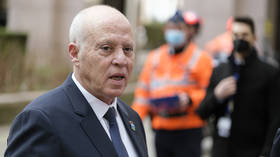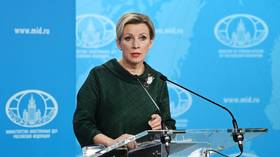African nation rejects EU financial aid

Tunisian President Kais Saied has rejected financial aid from the European Union intended to support the country’s budget and address a migration crisis, claiming that the bloc violated agreements signed earlier this year.
“Tunisia rejects what the EU announced, not because of the small amount... but because this proposal contradicts the memorandum of understanding signed in July,” Saied said on Monday, according to a statement published by national broadcaster TAP.
The EU signed a partnership agreement with Saied in July, pledging more than €1 billion ($1.12 billion) to the North African country to help its battered economy and curb irregular migration from the Tunisian coast to Europe.
However, the European Commission announced last month that it would disburse €127 million ($133 million) in aid to the country, with the majority of the funds earmarked for addressing migration issues, including facilitating the deportation of migrants to their home countries.
In response to the EU announcement, Tunisia’s president said on Monday that he would not accept the “small amount” because it “lacks respect.”
“Tunisia, which accepts cooperation, does not accept anything that resembles charity or handouts,” Saied was quoted as saying by TAP during a meeting with Nabil Ammar, the country’s minister of foreign affairs and migration.
In an interview with RT on Tuesday, international relations researcher Bechir Jouini said Tunisia’s rejection of the EU offer centered on the bloc’s handling of the agreement, which appears to prioritize financial aspects over other considerations.
If the EU wants to address the immigration crisis, Jouini believes it should prioritize genuine investments in African economies over exploiting the continent's resources.
“We are not just demanding money,” he said, arguing that “if there's no stability, if there's no growth in Africa, there's no stability in all of Europe.”
Migration has remained a source of disagreement within the EU since 2015, with an influx of migrants fleeing poverty and conflicts in Africa and the Middle East. Member states, including Hungary and Poland, have strongly opposed Brussels’ attempts to compel them to accept and settle migrants.
Last month, Italian authorities reported the arrival of thousands of African migrants from Tunisia on the island of Lampedusa, prompting a state of emergency.












